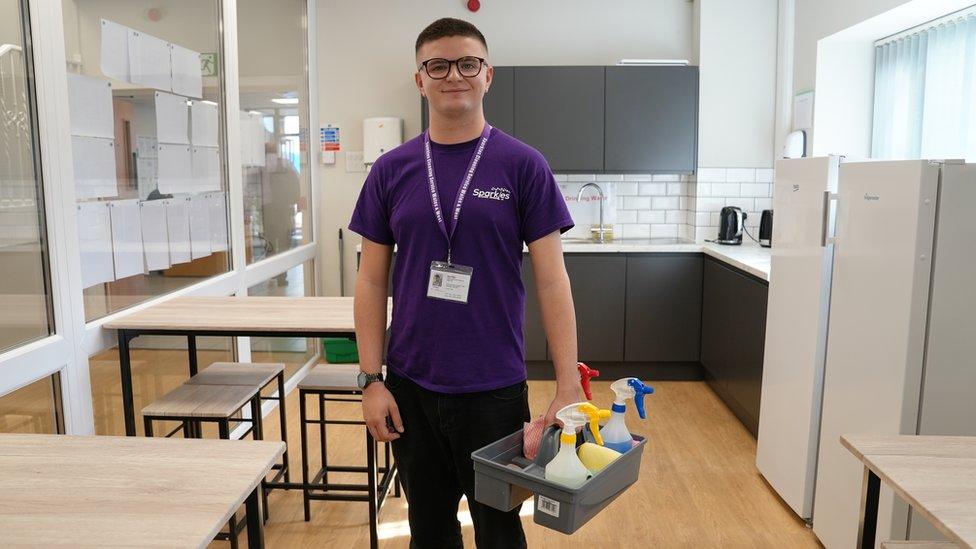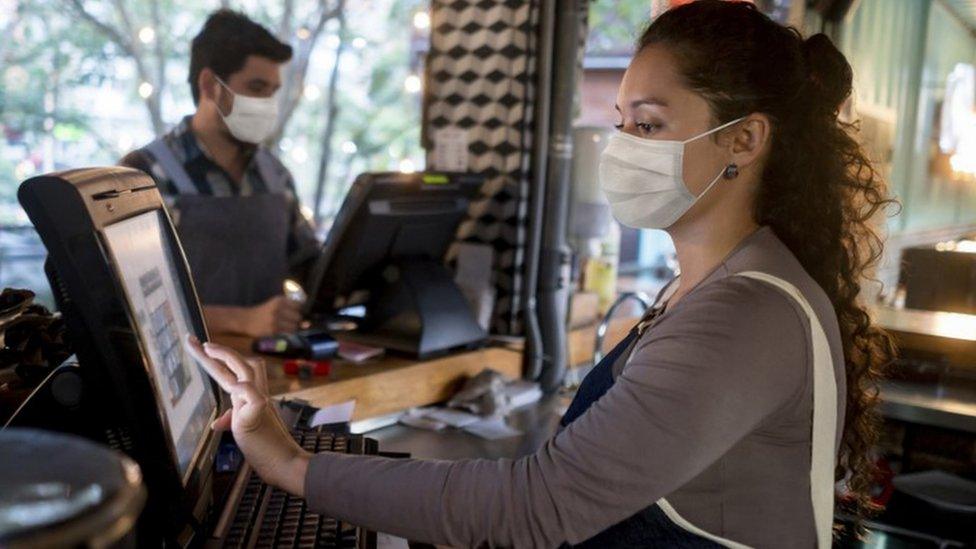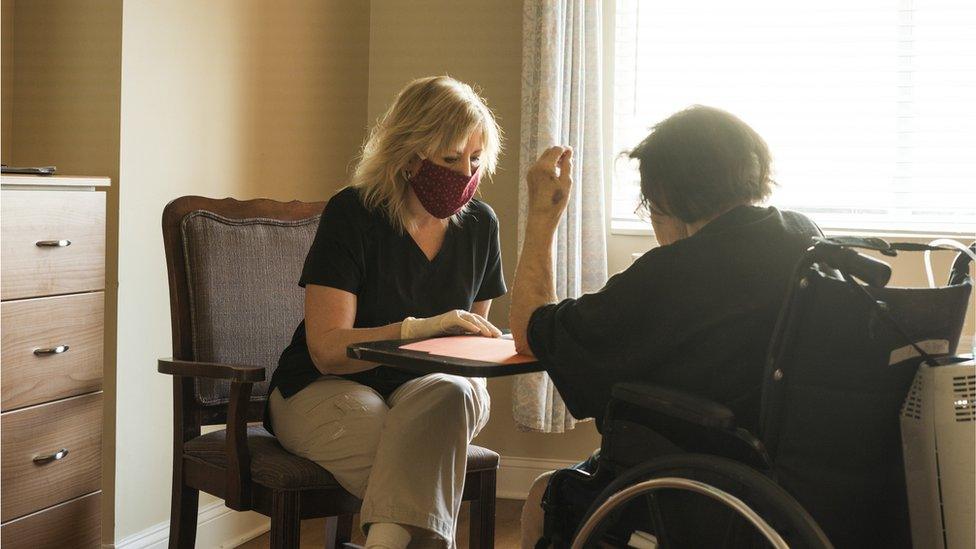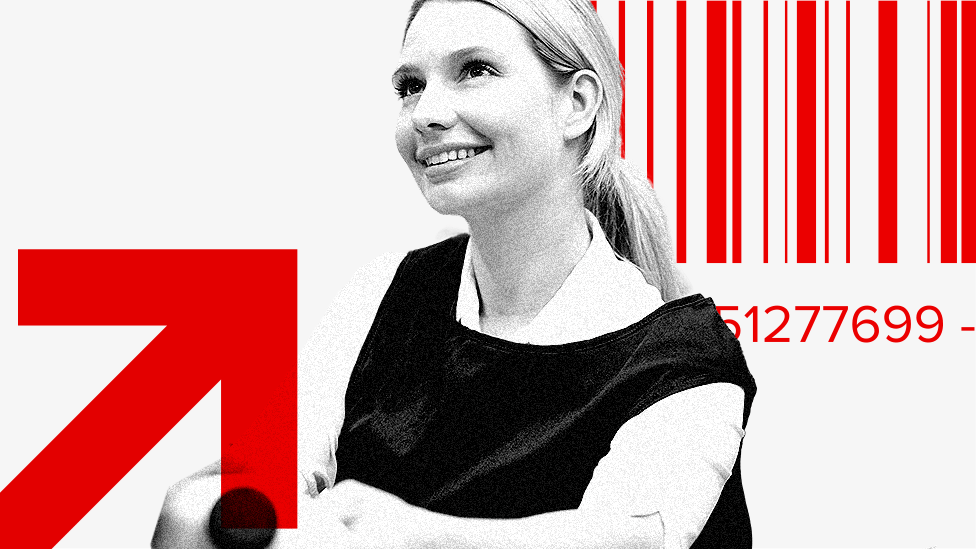Real living wage rise will help workers as costs soar
- Published
Cai says the extra money has made a real difference
A worker earning the real living wage has said he will be able to save towards his future after a £1 rise was announced.
Cai Pridham, 21, from Llanharan in Rhondda Cynon Taf, said moving from the minimum wage to the real living wage had "changed the way I live my life".
He is employed by cleaning company Sparkles, which has committed to paying the higher £10.90 an hour rate.
About 400,000 workers across the UK are set to receive the record pay boost.
"I can use that money for a rainy day," Mr Pridham said.

Cai says he never thought a house or new car was 'achievable' before he started to get paid the real living wage
"[I can] put it towards the future, save towards a house, which I'd never have thought of if I was getting paid the minimum wage."
He was able to get a new, more reliable car at the beginning of this year to get him to and from work.
"I go out most weekends now with extra money that I got from getting paid so well. I treat myself and I go on holiday twice a year and it's made a difference."
In his previous job in retail, he earned "about £8 an hour", he said, having progressed from £5 an hour when he was 16 years old. "And now I'm on £11.33 - a huge difference."
"I'm proud of where I am now. I'm able to put some money in my Help to Buy," he said. "Hopefully, I'll own my own home in the next couple of years."
More than 18,000 people in Wales work for an employer signed up to the voluntary scheme.
The Living Wage Foundation said its highest ever rise reflected a "sharp increase in living costs".
Welsh businesses called the rise worrying as they try to balance fair pay with staying in business.
Almost 500 Welsh employers, including Dŵr Cymru Welsh Water and the Wales Millennium Centre have committed to honouring the rate.
Latest figures showed typical hourly pay in Wales is one of the lowest in the UK and the Living Wage Foundation said more than one in five people are paid less than the real living wage.

Sparkles director Ceri Jennings says being a real living wage employer help with staff retention
Sparkles managing director Ceri Jennings said it was the "right time" to pay the extra pound an hour.
"Everybody is worried about the cost of living and how they are going to afford just the basics, full stop," she said.
"[The increase] does make a difference... it means that you're valuing them."

What is the 'real living wage'?
The voluntary "real living wage" is set by the Living Wage Foundation, external charity. It is higher than the legal minimum wage, reflecting what the charity thinks people need to earn to cover everyday needs
It is currently £11.95 per hour in London, and £10.90 per hour elsewhere in the UK
More than 10,000 employers throughout the UK have signed up to the policy, covering more than 300,000 workers
The includes 18,600 people in Wales working at 500 Welsh businesses
The compulsory national living wage is £9.50 an hour for anyone over the age of 23
263,000 workers in Wales are currently paid less than the Real Living Wage, or 22% of all jobs, according to the Living Wage Foundation


Nearly 500 companies in Wales have voluntarily agreed to pay their staff the real living wage
Living Wage Foundation director Katherine Chapman told BBC Radio Wales Breakfast that the higher rate could make a huge difference for people with families in particular, allowing them to put decent food on the table and put the heating on.
"This is about people's doing a fair day's work earning a wage that means they can have a decent quality of life. Being able to set a bit aside at the end of the month," she said.
But business representatives have warned of the possible consequences for businesses.
Ian Price, director of CBI Wales, said employers were already putting up wages so the increase was "not out of kilter".
Although he said he understood the reasoning behind the rise, Mr Price there were already "so many pressures on businesses".
"It is a real worry as to how some... signed up for the real living wage are going to manage."

The real living wage is not to be confused with the compulsory national living wage of £9.50 an hour
Some will have to pass on the cost to their customers, he said, admitting "there aren't any easy answers at the moment".
"It's pressures wherever you turn, so businesses are having to make some tough choices," he added.
For some employers signed up to the scheme, it could mean a 10% rise to their wage bill.
"It's a lot of money," said Richard Selby, chair of the Institute of Directors in Wales, which represents about 500 businesses.

Richard Selby from the Institute of Directors says the £1 rise is "a lot or money" and will cause problems for some businesses
He said it was "difficult to find a balance between giving fair wages to employees and sustaining their businesses".
"It's not something you can pass straight on to customers," he said, "so I imagine it's going to cause of few problems."
But he said employers in Wales had "to find a way to help their staff".
"We need them to be fit for work, well fed, properly housed so they are rested and ready for work," Mr Selby said.
"Businesses in Wales have innovated on how to support employees yet maintain viable businesses."
Ms Chapman, from the Real Living Wage Foundation, acknowledged it was a really difficult time for businesses, but said "these are employers choosing to focus during these tough times on those employees who are earning the least in their organisation".
She argued these were also business benefits, due to a large number of vacancies at the moment in the labour market.
"It helps attract and retain staff which in turn lowers recruitment costs," she said.
- Published15 November 2021

- Published15 June 2021

